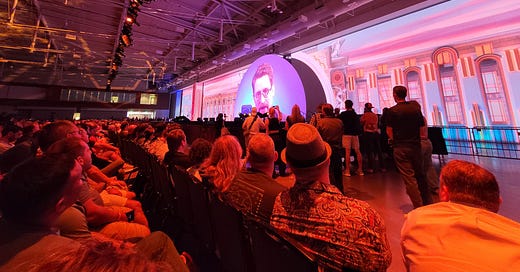Speaking, somewhat interestingly, right before RFK Jr this evening was Edward Snowden. It was interesting in part because a recurring theme from Snowden was “cast a vote, but don’t join a cult”. Politicians have their own interests and reasons for acting. Get what you need from them, but don’t give yourself to them.
If RFK’s talk was hopeful, Snowden’s was all about danger. We all sense there is something wrong with the internet, he said, because there is something wrong with the world. A system has been constructed around us that is unfair. There is a concentration of resources into fewer and fewer hands, and even with voices, it’s winner take all. [I have often said that the story of the last decade is nominally decentralized systems, but then a few winners take all. You could shop at ANY STORE ON THE PLANET now, but you purchase everything from Amazon.] Minority opinions, Snowden said, survive on the edges at the indulgence of the censor.
People should have the ability to dissent and disrupt, basically without consequence (and he made it very clear this applies to protestors on the Left and Right, both of which have found themselves cancelled recently). That’s how we progress. If we stop allowing dissent, that like saying we’ve reached the end, there is no more progress yet to come.
The system as it presently exists is designed to extract resources and return them to the hands of the censors. Our lives have been disintermediated by panes of glass, by screens. And, “click OK to continue”, we’re told over and over again. To use our devices or a resource at all, we have to agree to rules created by others. There is a systematization of tech designed to order our lives to the benefit of institutions.
Genuinely open technology is good. Open-AI, the creators of ChatGPT, is not open. They don’t want you to see their model. The good news is, it’s getting easier to run this stuff (e.g. AI software) on your home computer. Facebook has been, bizarrely, good about getting this do-it-yourself tech into people’s hands. They aren’t doing it because they like you, they’re doing it because they fear their competitors building a structure around them, so they want to decentralize this tech to prevent that from happening. But even if for reasons of self-preservation, they are doing a good thing.
We all love bitcoin here, but worth remembering… bitcoin transactions are not private. Only Elizabeth Warren probably still believes that bitcoin is anonymous and money for criminals. No, if not publicly doxxed, an enormous number of bitcoin transactions are at least privately doxxed (e.g. the exchange knows who owns that address). And exchanges happily share that information with regulators, as there is nothing they fear more than a lawsuit.
Well, your transaction history is your life history. Imagine what someone could learn about you by analyzing the what (and when and where) of every time you spent money. When Snowden worked at the NSA, they called this metadata. And to look at it wasn’t even considered a 4th Amendment violation, after all nobody was really reading your messages. No, but it was what we may as well call “activity records”, the information a guy would get following you around all day long.
Used to be, you needed a human analyst to look through all this metadata, which they could only do so quickly, of course. Machine learning models are changing this. And there is zero-regulation to prevent this. And it isn’t just coming from the NSA, but also agencies like the IRS.
Imagine getting the life of every person, every day, on a live feed, being interpreted at machine speed. Maybe a banking officer, seeing a flagged transaction, gets a “do you want to continue?” question about your life. Maybe there is a brand risk to us if we continue our association with you, he thinks. Safer just to cut you off. And even if you’re a mega privacy guru, you can avoid this you think, your friends probably aren’t, and their activities will also point to you. The space for anyone to have a private interaction will diminish.
With machine learning and AI, enormous datasets are a liability. The United States is the only major democracy on the planet without a privacy law. The consequences of ignoring this are about to get a lot worse.
So, our broken internet reflects a broken world. Unfair systems cause dissatisfaction, which makes them unstable systems. You ever get the feeling that every public discussion now feels like an instrument of war by other means? We compete constantly, and cooperate rarely. Or, does it sometimes feels like elections are actually less meaningful than they should be? Are our two front runners right now really the two best Americans? How did we get here?
We need to start working together to find our way out of this system. Competition is everywhere, but it is only competition against the powerless. Big institutions cooperate to protect themselves, against you. We have to work our way out of this, lest we become the land of the fee, and home of the slave.
THE END
Affiliate Links
Swan Bitcoin: http://swan.com/davidshane




Thanks. Very interesting.